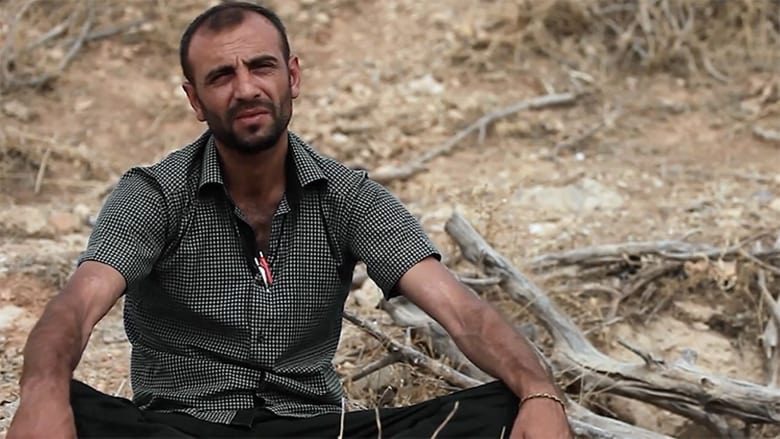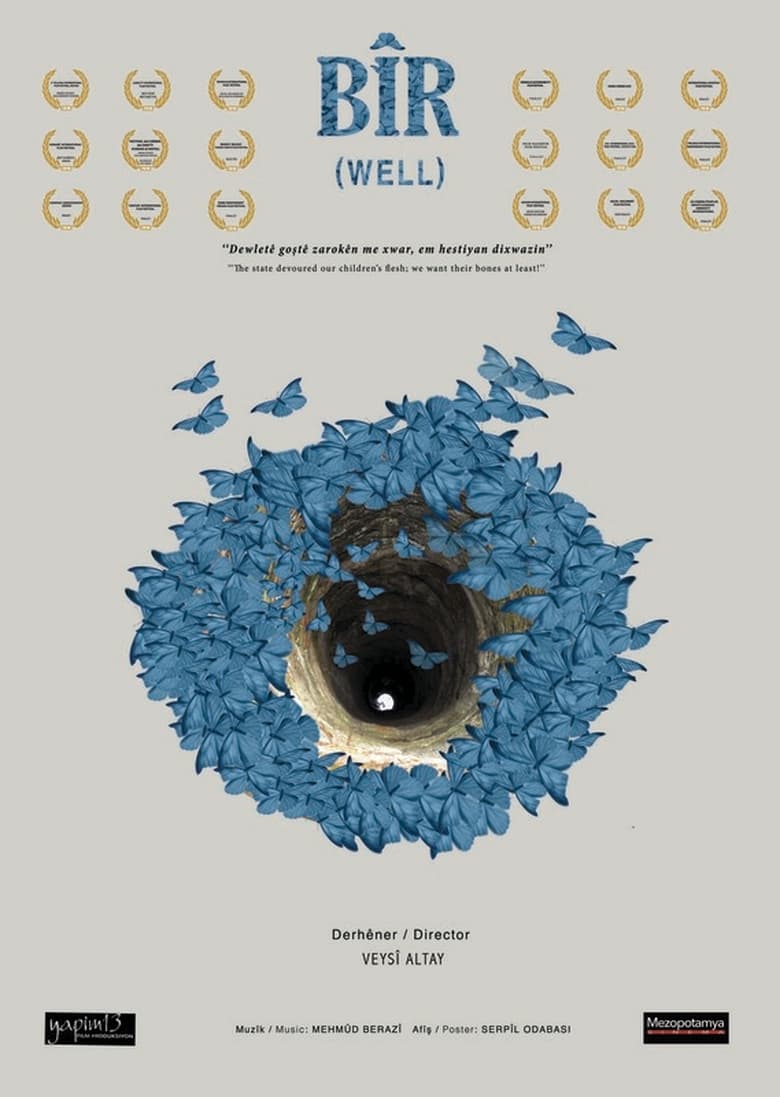Loading


Well
Genres
DocumentaryHistory
Overview
In the 1990s many people in Kurdistan were taken into custody and interrogated under torture; their killers disposed of the bodies by throwing them out of helicopters, or burying them in acid-filled wells. Thousands were murdered/disappeared by paramilitary forces—such as Jitem and Hizbul-Kontra—that were financed and supported by the state, though they have always stuck to the line: “We didn’t do it.” The documentary looks at the case of seven people, including four children, who were disappeared from the town of Kerboran [Dargeçit] in 1995, and tells the story of their families’ tireless search for their bones
Details
Budget
$55500
Revenue
$0
Runtime
62 min
Release Date
2018-05-16
Status
Released
Original Language
Kurdish
Vote Count
1
Vote Average
7
Cast
Meet the talented actors who bring the movie to life.
Similar Movies
Explore movies similar to this one that you might also enjoy.
6.2
The Basque Ball: Skin Against Stone
An attempt to create a bridge between the different political positions that coexist, sometimes violently, in the Basque Country, in northern Spain.
2003-10-03 | es
6.1
The Lark Farm
The Lark Farm is set in a small Turkish town in 1915. It deals with the genocide of Armenians, looking closely at the fortunes, or rather, misfortunes of one wealthy Armenian family.
2007-05-04 | it
6.8
Danton
Danton and Robespierre were close friends and fought together in the French Revolution, but by 1793 Robespierre was France's ruler, determined to wipe out opposition with a series of mass executions that became known as the Reign of Terror. Danton, well known as a spokesman of the people, had been living in relative solitude in the French countryside, but he returned to Paris to challenge Robespierre's violent rule and call for the people to demand their rights. Robespierre, however, could not accept such a challenge, even from a friend and colleague, and he blocked out a plan for the capture and execution of Danton and his allies.
1983-01-12 | fr
0.0
Seeing Through the Darkness
The film follows five people who lost their sight in armed conflicts, gathering fragments of their present-day lives. Through an enveloping sound composition, veiled archival material, footage shot by the protagonists themselves, and a sensitive visual approach, the film explores memory, perception, and our relationship to the visible. Steering away from spectacle, it invites us to hear what often goes unheard, and to feel differently. In an age saturated with images, this documentary offers a sensory experience where listening becomes a gesture of resistance and human reconnection.
2025-05-30 | uk
0.0
Love Commandos
In India, young people must marry someone approved by the family. Those who fall in love with someone else risk being killed for dishonour. But now they have someone to turn to for help: the Love Commandos.
2024-10-19 | es
0.0
No Traces of Life
Building on Forensic Architecture’s previous investigation into herbicidal warfare and its effects on Palestinian farmers along the eastern perimeter of the occupied Gaza Strip, this investigation marks Land Day in Palestine by examining the systematic targeting of orchards and greenhouses by Israeli forces since October 2023. Our analysis reveals that this destruction is a widespread and deliberate act of ecocide that has exacerbated the ongoing catastrophic famine in Gaza and is part of a wider pattern of deliberately depriving Palestinians of critical resources for survival.
2024-03-29 | en
0.0
The Raging Soil
A story of the sacrifice of farmers in defending their land from the mining permit given by the local government to a big company in the district of Lambu.
2014-05-12 | id
6.0
The Crossbow Murders: The Killings That Shocked Britain.
Uncover the chilling true story of Kyle Clifford, a 26-year-old ex-soldier whose brutal murders of Carol, Louise, and Hannah Hunt shocked Britain. This documentary delves into the heinous crimes that led to his life sentence.
2025-03-31 | en
0.0
Josiane, la passion de l'autre
2017-03-04 | fr
0.0
Make Turkey Great Again
2025-04-03 | ca
8.1
The Silence of Others
The story of the tortuous struggle against the silence of the victims of the dictatorship imposed by General Franco after the victory of the rebel side in the Spanish Civil War (1936-1975). In a democratic country, but still ideologically divided, the survivors seek justice as they organize the so-called “Argentinian lawsuit” and denounce the legally sanctioned pact of oblivion that intends to hide the crimes they were subjects of.
2019-01-25 | es
0.0
River of Tears and Rage
River of Tears and Rage is a film culled from Kodao Productions' Facebook Live coverage of Baby River's wake and burial. Amid a raging coronavirus pandemic, a dead three month-old infant became a symbol of political repression by a regime denounced worldwide for its crimes against the people.
2021-10-16 | en
10.0
Sa Ngalan ng Tubo
A documentary on the struggle of millworkers, farmworkers, and people of Hacienda Luisita, Philippines.
2005-01-01 | en
6.9
Stalin and the Katyn Massacre
The Katyn massacre, carried out by the Soviet NKVD in 1940, was only one of many unspeakable crimes committed by Stalin's ruthless executioners over three decades. The mass murder of thousands of Polish officers was part of a relentless purge, the secrets and details of which have only recently been partially revealed.
2020-02-18 | fr
0.0
The Painter's Room
Artin, a young Iranian bodybuilder, and Jahan, a Kurdish man who recently discovered his love for painting, live in Kærshovedgård, a former prison now used as a deportation center.
| ku
10.0
L'Aventure
In the Briançonnais mountains, in France, men and women on the roads of exile find the courage to cross the passes on foot, risking their lives. Arrived at the end of a long journey, exhausted, they do not know if they could settle down somewhere to start their life over. It is this transitional time that "The Adventure" tells. Ossoul, the Sudanese poet, Mamadou, survivor of an icy night at the Col de l'Échelle, Charlotte, Mother Courage and others are gradually getting back on their feet and settling to embark on a new life. Filmed over three years, "L'Aventure" is a story of resilience, friendships and revealed emotions. The portraits are drawn and deepened until everyone can recognize themselves in the other, put themselves in their place and understand them.
2021-01-24 | fr
7.4
The Collaborator
During the conflict in the former Yugoslavia many soldiers were convinced to kill fellow citizens including friends and relatives in the name of patriotism. The Kolaborator follows the story of Goran, 24, a promising young soccer player who is forced to become a soldier. Goran goes from being a talented athlete to an executioner virtually overnight. Following orders, Goran lines up civilians, shoots them and drags them into mass graves. Justifying his role as a protector of his people, Goran becomes increasingly detached from the task until his soccer coach and life-long friend, Asim, is led in front of him. As a familiar face stands defeated before him, Goran must reconsider his actions and choose between his own life and that of his dear friend.
2007-01-01 | en
7.4
The Magdalene Sisters
Three young Irish women struggle to maintain their spirits while they endure dehumanizing abuse as inmates of a Magdalene Sisters Asylum.
2002-08-30 | en
0.0
Salam Aleikum, Ingush people!
Documentary film about ethnic cleansing in the Prigorodny district in October-November 1992.
1993-01-01 | ru
6.1
Ararat
Interrogated by a customs officer, a young man recounts how his life was changed during the making of a film about the Armenian genocide.
2002-05-20 | en